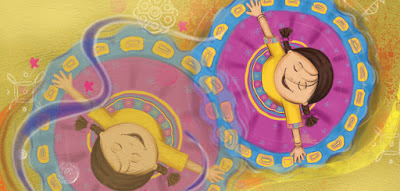The Language Club

siblings on a working weekend. One of his close friends and colleagues, an
Omani, stopped to chat with us, as usual, on his way out. “Allah, you chikoos are
here?! But your father, he gone back to Pakistan!” he said in mock horror. We
laughed, it was a running joke with him. “Ahhh… yes, yes, I forgot. You not
Pakistan,” he grinned, “You Hindi.” I had yet to learn that Hindi is the Arabic
word for ‘Indian’ and so I started a little at that. “No,” I said to him, “I am
English.” He guffawed, “No habibi, you is Hindi.” “No, no, Ali Uncle, I is definitely
English.”
mother as he told her the story. I scowled as they pointed and said, “She’s
English.” It was very annoying.
case in our family.
four languages spoken every day, often by the same people who seemed to
effortlessly shape-shift between Arabic and English and Hindi or Urdu or
Gujarati or Tamil. An Italian girl who sat beside me in class spoke English with a
British accent to our teachers but rolled her eyes and grumbled in Swahili to her
sister when she was annoyed. On the playground we learned the word for ‘bum’
in Malayalam. My brother came home and proudly told us he could crudely
suggest a crow had eaten someone’s testicles in Sindhi. In the years to come, we
would know how to say ‘I love you’ in languages from across the world.
Bengalis and Tamils will still lapse loudly into theirs at social gatherings sending
non-speakers directly to Twitter to kvetch about it.)
Mother tongues contain the ability to convey the personality of a people through
unique idioms. (An Israeli friend would shrug, “Sometimes onion, sometimes
honey.)
never met my great grand parents but they too spoke in English at home. When
necessary, they spoke the East Indian version of Marathi. This Marathi, peculiar
to the native population of Mumbai, was I suppose our only tenuous link with a
‘real mother tongue’. We didn’t speak it. It was something my parents dipped
into when they didn’t want us to understand what they were saying to each
other. We also knew there were hilarious, bawdy wedding songs. And in my
mother’s warbly repertoire, a solitary Marathi lullaby about baby teeth like a
crab’s claws.
people would sneer at me.
Indian language. I didn’t know that the use of English for official purposes was
supposed to cease in 1965, fifteen years after the Constitution came into effect. I
didn’t know about the Official Languages Act which allowed for the use of
English alongside Hindi after 1965 to accommodate the non-Hindi speaking
parts of the country. Or the fact that India has the second largest population of
English speakers in the world (Pakistan is third).
all of 0.019% of the population. We’re quite the rarity. Instead I’d stutter and feel
embarrassed like they were pointing and laughing “You English!” all over again.
Interjections like “Arre!” and “Yaar”. I added slang, “Tapori”, “Pakao”, “Fasao”. (I
also tried that thing of adding a ‘fy’ to make something into a verb – ‘jugaadify’ –
but that didn’t work out.)
gate, waiting for our children and listened with increasing discomfort as they
railed against the sort of people who spoke English at home. I changed my son’s
school that year.
real metropolis and therefore generous and good-natured with anyone
attempting communication. Everyone speaks a little of everything and as a result
I became more confident speaking in Hindi. Now I’m fluent enough not just to
hold a conversation but manage sarcasm and humour as well. One of my finest
moments was when our Hindi tuition teacher who never misses a chance to
complain about us “English speaking Bandra people” remarked that my Hindi
was really quite good. (The ‘for an English speaking Bandra person’ I assume,
was left unsaid.)
They’d congregated from around India and the globe and eager to catch up, we
all talked over each other. At some point, an old friend said, “You haven’t
changed much but you speak like a pukka Mumbai girl now.”
is, bless him and how I would love to tell him I am now, “Hindi English”. And it is
the mother tongue of my children.
 |
| Illustration by Suvidha Mistry |








